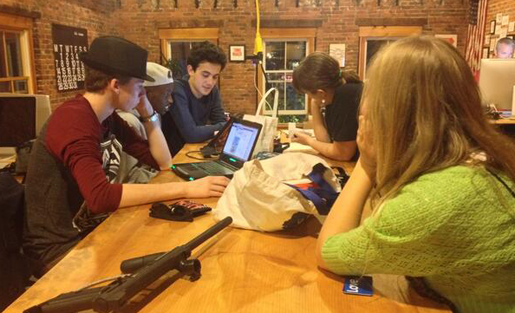What’s the purpose of the library?
It’s an interesting question when you consider it. In a day and age when information is not only prevalent but personalized, making even the once-common encyclopedia collection irrelevant, what role do libraries play in their communities today? It’s a question many librarians are tackling aggressively.
IT’S ABOUT BOOKS, RIGHT?
The institution of the public library became popular in the United States in the late 1880s when philanthropists — most notably Andrew Carnegie — started building libraries in cooperation with local communities. Before public libraries, there wasn’t easy access to books, and printed information was largely in the form of newspapers. Books were expensive and bookstores rare. The idea of accessing and borrowing books was therefore hugely popular.
Fast-forward roughly 130 years, and the information landscape has changed radically. Bound books are inexpensive and so easy to access they’re delivered to our doorsteps. Entertainment, news, reference materials, discussions, and more are accessible on our mobile phones. Not for everyone, mind you. Some technology, and the information it enables, is exclusive to those who can afford the hardware and services. However, it’s prevalent enough that many students’ faces can be seen lit by the blue glow of their screens, walking down sidewalks on a crisp autumn evening.
If you were walking into a modern-day library on this same autumn evening, you would see large rooms dominated by shelves of books, not all that different from their historical roots. Behind those shelves, the systems tracking all that information, and the people administering them, are slowly changing. For example, most libraries offer free Internet access to patrons, and usually they have computer kiosks available in case you don’t have a laptop or mobile phone to use.
EXPERIMENTS AND REINVENTION
More radical experiments are happening as well. In Vermont, there is a lot of interest in creating Maker spaces in libraries. The Maker movement took off in the last decade, a kind of DIY engineering for those interested in circuitry, robotics, modeling, and more. Libraries are beginning to offer everything from craft materials to 3D printers. In August of 2014, the Vermont Department of Libraries created the first E21 conference, a gathering of librarians and teachers interested in learning more about programmable circuit boards, 3D design, multimedia, wearable technology, and how these may fit into their library’s services. For two days, librarians learned to program, attended discussions on creating Maker spaces within the library, and hacking on projects long into the night.
In Chattanooga, Tenn., more aggressive experiments are performed. The Chattanooga Public Library has dedicated more than 12,000 square feet to a learning laboratory environment they call the 4th Floor. The space hosts equipment, expertise, and regular meetings on topics such as design, technology, and the applied arts, sometimes with representatives from Google and Mozilla present. They’ve also created more radical experiments with a library public garden, gathering a community around planting, tending, and harvesting food to discuss issues like the environment and social equality.
CREATIVE FORECASTING
In this spirit of evaluation and reinvention, the 2nd Annual StoryHackVT contest is addressing the contemporary challenges faced by libraries. StoryhackVT is partnering with the Vermont Department of Libraries to creatively explore what the changing role of libraries within communities and schools might become.
The contest is a 24-hour hackathon-styled event where multi-disciplinary teams of media makers, writers, developers, designers, and more gather to develop stories across many digital platforms focused around a common theme or challenge. The hope is that the contest will create ideas that spark larger media projects or discussions around these big changes faced by the library system.
StoryHackVT happens September 27 and 28, 2014 in Burlington, Vt., and is open to any creative personality who cares to participate, regardless of where they live. Teams are encouraged, as the multi-platform aspects of the projects can be overwhelming for just one person. More information about the event can be found at http://storyhackvt.com
AND THE WINNER IS…
In both biological and in social systems, evolution is never clear in the moment. Change is happening in libraries across the country. The Boston Public Library is renovating its space to include a retail store, space friendlier to teenager social and technological habits, and mobile workers. The New York Public Library once flirted with removing its historical stacks in favor of a large open space, but public outcry changed those plans. In San Antonio, Texas, there’s a digital library with access to 18,000 digital titles, and some 600 e-book readers, but not a single bound book included inside the building.
And then, some libraries float on the middle of a lake.
The changes that find favor and ultimately alter the library’s purpose may not be the most obvious or popular changes; they’ll be the ones that get used. Right now, everything is being considered, which makes this a very interesting time to walk into a library.
Correction: A previous version of this post incorrectly identified the location of the the Chattanooga Public Library.
Nate Herzog is the creator of StoryHackVT, a contest creating connections between media makers and interested organizations. He is also an entrepreneur, media maker, and writer. You can find him on Twitter @n8zog or can follow StoryHack events at @_storyhack


